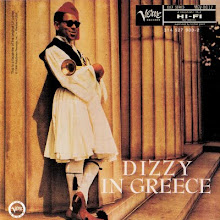
Here's Pharoah Sandres' legendary "Tauhid" featuring the great late Sonny Sharrock (see previous post). Although introduced as a protege of John Coltrane and touted by many as his heir apparent, reedman Pharoah Sanders quickly proved his own man. His shared interest in the "cosmic" music of Coltrane's final period belies the fact that Sanders frequently plays with an unhurried sense of peace and satisfaction rarely found in his mentor's music. His use of space, African and Asian motifs and instruments, and simple, repetitive melodies also pointed the way for jazz, rock, and new age musicians in the '70s and '80s, while his sometimes raucous use of harsh, shrieking runs influenced many of jazz's most adventurous saxophonists.
Tauhid showcases both of those abilities. By turns meditative and impulsive, Tauhid's lynchpin is the 17-minute "Upper Egypt and Lower Egypt," on which Sanders plays piccolo in the first half and tenor sax in the second; the duality of the composition suggests both the ancient and modern aspects of Africa and, in turn, its melding with European and American culture. "Japan," a short composition on which Sanders performs a warm, spry vocalese, is both folksy and engaging, while the album's closing triumvirate of "Aum," "Venus," and "Capricorn Rising" proves wild and woolly.
track listing:
1. Upper Egypt & Lower Egypt 16:16
2. Japan 3:24
3. a. Aum b. Venus c. Capricorn Rising 14:46
personnel:
Pharoah Sanders (Tenor and Alto Saxophone, Piccolo and Vocals)
Sonny Sharrock (Guitar)
Dave Burrell (Piano)
Henry Grimes (Bass)
Roger Blank (Drums)
Nat Bettis (Percussion)
rec. 1967


